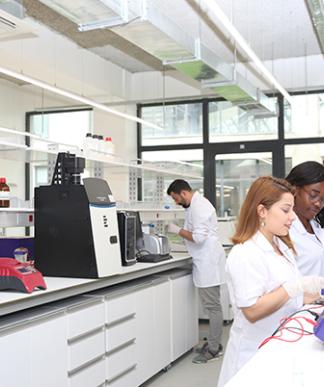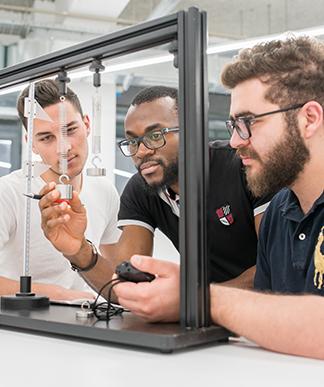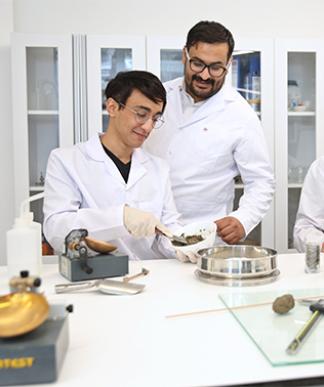


About the Department
Petroleum and Natural Gas Engineering is one of the most important among all engineering disciplines, due to the use of fossil fuels as an energy source, its effect on the economic balance, and the estimated depletion of the reservoirs. Exploring new reservoirs, operating them economically, and transporting the produced petroleum to the point of use with concern for the environment is therefore extremely important for the future of mankind. We aim to be members of the petroleum industry and contribute to both the production and measures to protect the environment (in addition to the exploration, operation, and transportation sides of the trade).
Education Opportunities
The program is designed to prepare graduates to be proficient in mathematics, probability and statistics, fluid mechanics, strength of materials, and thermodynamics. The field-specific topics for petroleum engineering include: design and analysis of well systems, drilling and completing wells, evaluation of subsurface geological formations using geoscientific and engineering methods, design and analysis of systems for producing, injecting and handling fluids, application of reservoir engineering principles for optimizing resource development and management, the use of project economics, and resource evaluation methods for design and decision-making. The content is completed with a graduation project experience that prepares students for engineering practices, incorporating engineering standards and realistic constraints.
The students greatly benefit from technical visits, summer training, and seminars given by professional engineers and administrators of petrol companies. Career days organized by the university enable students to better understand the petroleum and natural gas sector.

Career Areas
Graduates of this program can easily find job opportunities in local or international firms dealing with petroleum and/or natural gas. The position can be in petroleum exploration, drilling, production, transportation, equipment development and maintenance, or in the refining and development of petroleum products for specific practices. Petroleum and natural gas engineers can work as engineers in exploration and drilling, in production areas, in a refinery as engineers, or as administrators. Petroleum and natural gas engineers can also work as energy engineers focusing on the efficient utilization of petroleum products in all relevant fields.
Contact
Faculty of Engineering
Science and Technology Center, ST 226
Tel: +90 392 671 1111 Extension: 2401
Faculty E-mail: secretary-fe@ciu.edu.tr
Head of Department: Assoc. Prof. Dr. Mustafa Hakan ÖZYURTKAN
Head of Department: E-mail: hozyurtkan@ciu.edu.tr
Compulsory Courses
First Semester
INTRODUCTION TO COMPUTING
Course code
CMPE101Credit
3Theoretical
2Practical
2Ects
5READING AND WRITING SKILLS-I
Course code
ENGL141Credit
3Theoretical
2Practical
2Ects
4CALCULUS-I
Course code
MATH101Credit
4Theoretical
3Practical
2Ects
5GENERAL PHYSICS-I
Course code
PHYS101Credit
4Theoretical
3Practical
2Ects
6INTRODUCTION TO PETROLEUM ENGINEERING
Course code
PNGE100Credit
3Theoretical
1Practical
0Ects
3MODERN TURKISH HISTORY
Course code
TARH100Credit
0Theoretical
2Practical
0Ects
2TURKISH
Course code
TURK100Credit
0Theoretical
2Practical
0Ects
2Second Semester
GENERAL CHEMISTRY
Course code
CHEM110Credit
4Theoretical
3Practical
2Ects
6INTRODUCTION TO PROGRAMMING
Course code
CMPE112Credit
4Theoretical
3Practical
2Ects
6READING AND WRITING SKILLS-II
Course code
ENGL142Credit
3Theoretical
2Practical
2Ects
4CALCULUS-II
Course code
MATH102Credit
4Theoretical
3Practical
2Ects
5GENERAL PHYSICS-II
Course code
PHYS102Credit
4Theoretical
3Practical
2Ects
6FREE ELECTIVE
Course code
PNGEXX1Credit
3Theoretical
3Practical
0Ects
Third Semester
ENGINEERING DRAWING
Course code
CVLE101Credit
3Theoretical
2Practical
3Ects
5THERMODYNAMICS
Course code
ENRE301Credit
4Theoretical
3Practical
2Ects
7ENGINEERING ECONOMY
Course code
INDE232Credit
3Theoretical
3Practical
0Ects
4DIFFERENTIAL EQUATIONS AND LINEAR ALGEBRA
Course code
MATH201Credit
4Theoretical
4Practical
1Ects
5INTRODUCTION TO PROBABILITY AND STATISTICS
Course code
MATH205Credit
4Theoretical
4Practical
1Ects
6GENERAL GEOLOGY
Course code
PNGE132Credit
3Theoretical
3Practical
0Ects
4Fourth Semester
ENGINEERING MECHANICS-I
Course code
CVLE211Credit
4Theoretical
4Practical
1Ects
6FLUID MECHANICS
Course code
CVLE331Credit
4Theoretical
4Practical
1Ects
6MATHEMATICAL METHODS FOR ENGINEERS
Course code
MATH202Credit
4Theoretical
3Practical
2Ects
5NUMERICAL ANALYSIS
Course code
MATH204Credit
3Theoretical
3Practical
1Ects
4NON-TECHNIC ELECTIVE
Course code
PNGEXX2Credit
3Theoretical
3Practical
0Ects
TECHNICAL ELECTIVE
Course code
PNGEXX3Credit
3Theoretical
3Practical
0Ects
Fifth Semester
SUMMER TRANINING
Course code
PNGE300Credit
0Theoretical
0Practical
0Ects
2DRILLING ENGINEERING-I
Course code
PNGE301Credit
4Theoretical
3Practical
2Ects
7PETROLEUM RESERVIOR ENGINEERING-I
Course code
PNGE311Credit
3Theoretical
3Practical
0Ects
5PETROLEUM PRODUCTION ENGINEERING-I
Course code
PNGE321Credit
3Theoretical
3Practical
0Ects
5WELL LOGGING
Course code
PNGE350Credit
3Theoretical
3Practical
0Ects
6TECHNICAL ELECTIVE
Course code
PNGEXX4Credit
3Theoretical
3Practical
0Ects
Sixth Semester
DRILLING ENGINEERING-II
Course code
PNGE302Credit
4Theoretical
3Practical
2Ects
6PETROLEUM RESERVIOR ENGINEERING-II
Course code
PNGE312Credit
3Theoretical
3Practical
0Ects
5PETROLEUM PRODUCTION ENGINEERING-II
Course code
PNGE322Credit
3Theoretical
3Practical
0Ects
5PETROLEUM GEOLOGY
Course code
PNGE331Credit
3Theoretical
3Practical
0Ects
5TECHNICAL ELECTIVE
Course code
PNGEXX5Credit
3Theoretical
3Practical
0Ects
Seventh Semester
SUMMER TRAINING-II
Course code
PNGE400Credit
0Theoretical
0Practical
0Ects
2NATURAL GAS ENGINEERING
Course code
PNGE401Credit
3Theoretical
3Practical
0Ects
6PETROLEUM ENGINEERING DESIGN
Course code
PNGE403Credit
3Theoretical
3Practical
0Ects
7TECHNICAL ELECTIVE
Course code
PNGEXX6Credit
3Theoretical
3Practical
0Ects
TECHNICAL ELECTIVE
Course code
PNGEXX7Credit
3Theoretical
3Practical
0Ects
Eighth Semester
PETROLEUM PROPERTY VALUATION
Course code
PNGE404Credit
3Theoretical
3Practical
0Ects
7GRADUATION PROJECT
Course code
PNGE404Credit
4Theoretical
2Practical
4Ects
8TECHNICAL ELECTIVE
Course code
PNGEX10Credit
3Theoretical
3Practical
0Ects
TECHNICAL ELECTIVE
Course code
PNGEXX8Credit
3Theoretical
3Practical
0Ects
TECHNICAL ELECTIVE
Course code
PNGEXX9Credit
3Theoretical
3Practical
0Ects
Elective Courses
TR Applicants
TR Students who are successful in the exams conducted by the Higher Education Council Student Selection and Placement Center (ÖSYM) and are entitled to enroll in our university in line with their preferences can complete the registration process with the necessary documents for registration from our Registration and Liaison Offices throughout Turkey or from the Marketing Directorate on campus.
Click for detailed admission requirements information.
TRNC Applicants
TRNC citizens and TR citizen candidate students who have completed their entire high school education in TRNC. They are placed in undergraduate programs in line with their success in the CIU Student Placement and Scholarship Ranking Exam and the programs they prefer.
Students who are successful in the exam can register from the TRNC Marketing Office.
Applicants can directly apply online to our undergraduate programs using the application portal. Please fill in your details correctly and upload all the required documents listed on the last page of the application form.
Required documents;
- Completed application form,
- Higher/Secondary Certificate or equivalents (e.g. O/A’Level, WAEC/NECO),
- Evidence of English Language competence: TOEFL (65 IBT) or IELTS (5.5). Students without these documents will take the CIU English proficiency exam on campus following arrival,
- Scanned copy of international passport/birth certificate,
- Fully completed and signed CIU Rules and Regulations document (which can be downloaded during the online application).
Cyprus International University provides academic scholarships for its students as an incentive for success, with most students benefiting from 50%, 75% or 100% scholarships or discounted tuition fees. Click for more information.
| Non-Scholarship | 50% Scholarship | |
| Undergraduate Programs | € 5.843,00 | € 3.099,00 |
Click for more to learn about fees in line with the Tuition Fee Calculation system.